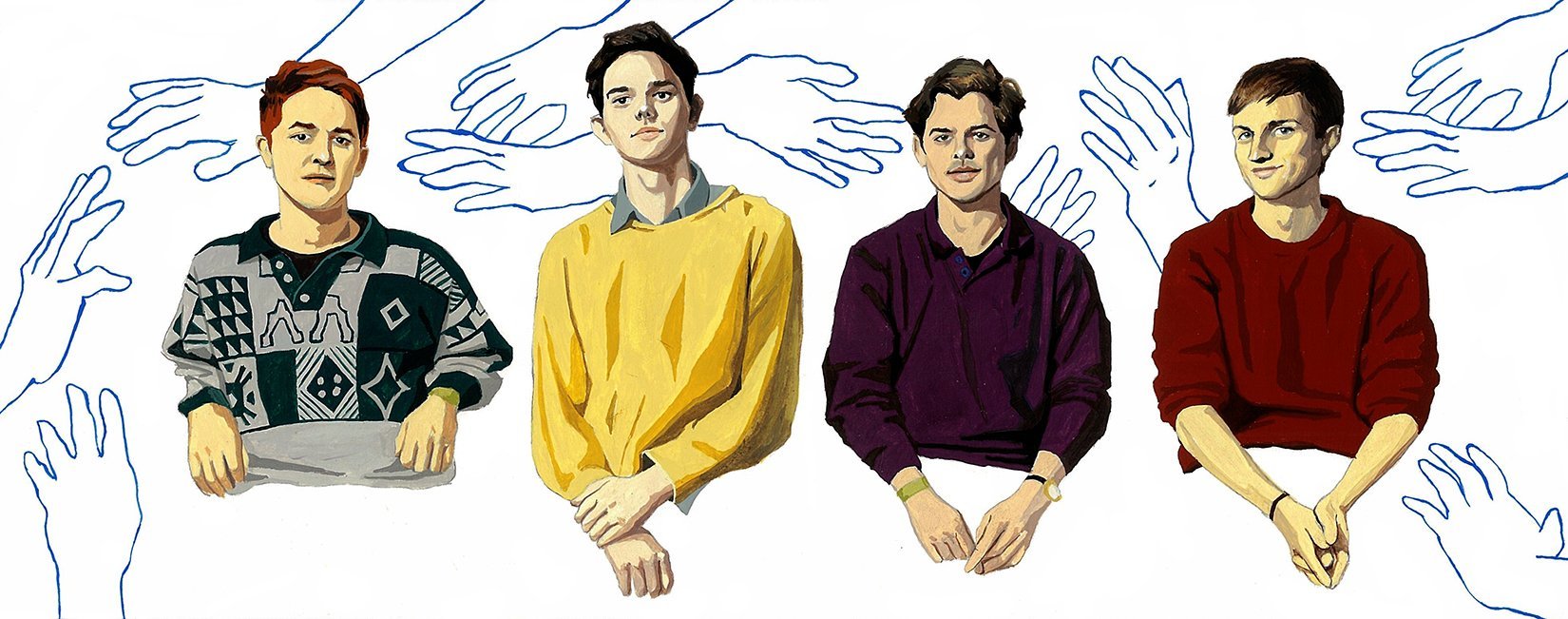We got a chance to chat with English band Adult Jazz, about their amazing debut, Gist Is.
- - - - - - - - - - - - - - - - - - - - - - - - - - - - - - - - - - - - - - - - - - - - - - - - - - - - - - - - - - - - - - - - - - - - - - - - - - - - - - -
Adult Jazz have quickly stolen our hearts with their breathtaking debut, Gist Is. Smothered with breathing and catchy melodies, Gist Is stands out as one of the most extraordinary albums we have listened to this year. Harry Burgess, frontman of Adult Jazz has answered our questions about Gist Is and the band’s background.
Space seems to be an important part of your song structures, while the progression of the song structure is also very important. Is this something conscious during the song writing?
I hadn’t really acknowledged the spaces so much until we started playing live- arranging music on a computer screen, visually, encourages you to think spatially and pauses and sparseness feels like less of a deviation from form. You can see the next bit coming up so you aren’t panicking; you know you’ll be saved eventually. When we have started playing these songs live, the sparseness and the pauses have felt a little more confrontational or bold because they are unfolding in real time, and you are responsible for that tension in the room. People don’t necessarily get the thicker, heftiness that bands often provide from our live show, it can be quite fragile.
We certainly wanted to use the ‘thick’ moments in songs sparingly with this record.
Progressive song structures are just something we really enjoy, so it felt natural to write like that. There were also a lot of lyrics, often as a dialogue of oppositional voices, to be dealt with in each song, so that has an impact on the moments in the song.
It seems that each member of the band is participating in song writing. Can you tell us about the creation span of Gist Is?
Usually I will have a little melodic motif or perhaps just an idea for the vague image of a song (like what it is made of, how it develops), and I will bring it to the band and flesh it out together. Often there will be a little lyrical signpost too that comes with the melodies.
We are all very involved in this development, and we are also all very involved in working on each other’s parts. I think this is because we are quite fluid with what instruments we play, so there isn’t a sense of ownership of certain instruments.
We also took plenty of time, and used the studio to consolidate and intervene with ideas as they formed.
The words Gist Is can be heard in a line in the song ‘’Donne Tongue’’. How did you decide to name the album Gist Is?
The line is ‘It does if you say it does / or / gist is exactly enough’ – which is a little allusion to the Euthypro dilemma. It’s basically this idea that was floating around about the nature of ‘goodness’ if it is determined by an omnipotent deity. Either there are some actual criteria for what is morally good, and a good god might be an expert at seeking those things out, or, certain things just end up morally good in virtue of god happening to like them. It’s the distinction between a moral code that is arbitrarily set at the whim of a deity, or one that we can have some access to and reason with.
The resonances for the record are the ideas about a legalistic, formalized conception of morality or an intuitive, responsive one when dealing with religious/political/spiritual ideologies. The record also looks more generally at the limits of formalized communication, and problems with conveying anything properly!
The use of guitars album seems interesting but at the same time it always sounds like one of the main layers. Can you name some inspirations in terms of the use of guitar?
I really can’t specifically name anyone for us I’m afraid. Sometimes the rhythm or actual physical sensation of what is being played seems more important than the notes. We like using guitar to mirror other instruments. We also don’t use too many chords on guitar, and kind of like the simplicity of two note chords when we do use them. We certainly like people that use guitar in a charismatic way, rather than keeping it neat!
The lyrics in Gist Is sometimes sound personal and sometimes sorcerous. What’s the dominant narrative in the lyrics according to you?
I’m not quite sure what you mean by sorcerous! They are personal in the sense that these hyperbolic voices in the song are preoccupied with similar things to me personally, they sing extremely about things I think about.
Would you label Gist Is as a concept album? It sounds pretty unique and it includes lots of different states of mind. Were you guys thinking about a main theme during the writing process?
I wouldn’t in the hardline sense, but there is a thread running through it. I think the theme we saw emerging was that of the limits of transcribed communication (particularly to do with morality) and how inarticulacy can be useful/powerful!
Can you inform us a little about the band’s background?
Harry, Steven and Tim came together from other bands and played as a trio in their teens arranging some songs that Harry had written. We enjoyed it a lot and reunited at university in Leeds, and we began playing together in the front room of a student house. We met Tom a bit later through a mutual friend, and started recording an album, and the three-piece became a four-piece.
Before we met Tom we would practice in the front room of our house, and work on single sections for hours. As a three piece, it leant towards a more clearly live sound, but when we met Tom we started using the studio to intervene more!
In your Tumblr page there’s a section called ‘’Idiot Mantra’’. And you shared a Van Morrison video in that section. Is there a kind of a bond between those songs?
That’s a leftover from a really early stage of Idiot Mantra, which actually ended up in Donne Tongue. The Van Morrison link is that line ‘Enlightenment, don’t know what it is’ – both the songs are about redemption’s intangibility.
Leeds’ music scene is like a treasure. How does it feel to be a part of that? How’s the cooperation between bands from your perspective?
We don’t live in Leeds currently- but when we started talking to people that is where we were based- so it feels weird to be called a ‘Leeds band’. But our experience in the city for four years was great. It was very welcoming and supportive of bands. Great places, like the Brudenell Social Club, offer up plenty of biggish support slots to small local bands. We weren’t heavily involved with other bands cause we didn’t play live much, we were mainly focusing on our record- but whenever we did everyone was very nice.












